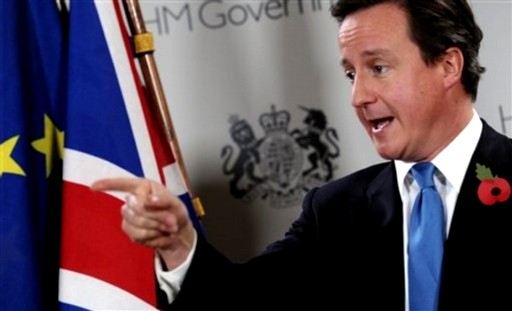
- British Prime Minister David Cameron gestures while speaking during a media conference at an EU summit in Brussels on Friday, Oct. 29, 2010. EU leaders on Friday agreed on tougher rules for spendthrift nations whose overspending threatens Europe's single currency and risks triggering a debt crisis. (AP Photo/Geert Vanden Wijngaert / Getty Images)
October 29, 2010 (KATAKAMI/ BBC) --- UK PM David Cameron says he has protected British taxpayers by putting the spotlight on reining in EU budget "excesses" at a Brussels summit.
He has been accused of "grandstanding" after saying he wanted the 2001 budget frozen, then agreeing to a 2.9% rise.
He said he had won agreement from 12 EU leaders that the rise should not exceed 2.9%, amid calls for a 5.9% rise.
Labour said his strategy had been a "complete failure" and some Eurosceptic Tories wanted a budget freeze or cut.
'Stopped juggernaut'
Mr Cameron is in Brussels for a two-day summit, where EU leaders have been discussing measures to avert another financial crisis within the eurozone.
But separately he has been pressing the case for limiting the EU's budget, arguing against a 5.9% rise for 2011 backed by the European Parliament and European Commission.
In a press conference at the close of the summit, Mr Cameron said he had made "a real difference" by putting the 2011 budget on the agenda and persuading other states to reject the "crazy" higher budget rise - which he said was now "dead".
While he had wanted a freeze in the 2011 EU budget, he said had been "looking down the barrel of a potential 6% increase" and his aim had been to stop it adding: "We have succeeded quite spectacularly, we put together a big alliance to stop that juggernaut of 6% in its tracks."
Of the 2.9% rise - which will cost the UK an extra £450m a year - he added: "I'm not pretending that is a giant Eldorado of a goldmine for the British public what it is is a lot better than what we were looking at and the key point is, it wouldn't have happened without our action."
He also said he had secured an agreement that from now on the EU budget "will reflect the spending cuts being made by national governments" - adding: "This is, I think, incredibly important, it will have a direct impact on the pocket of the UK taxpayer back at home. It is a significant prize."
'Could do better'
Mr Cameron also said, although final decisions were not taken this week, EU leaders had endorsed a "full British opt out" for the UK on strengthened enforcement measures for EU states - aimed at avoiding another financial crisis in the eurozone.
He said eurozone countries would simply formalise arrangements to bail each other out in a crisis - something that would protect British taxpayers.
Last week Mr Cameron said he was calling for "a cash freeze in the size of the EU budget for 2011". But on Thursday his officials briefed that he had accepted a freeze was not possible.
On Thursday Downing Street said the UK prime minister had "delivered an important first step towards ensuring the EU gets a grip on its finances for the future" by securing agreement from other EU states, including Germany, France, the Netherlands, Sweden and the Czech Republic, to limit the rise to 2.9% - the amount agreed by the EU Council of Ministers in August.
But Labour - and Eurosceptics in Mr Cameron's own party - have questioned whether it was much of an achievement.
Conservative MEP Roger Helmer told BBC Radio 4's Today programme: "I think we could have done better, I think we should have done better. Only two days ago we were talking about a freeze or even a cut and yet here we are rolling over - 2.9% is no great achievement, it's the position that the Council held beforehand."
He said Mr Cameron should have used German Chancellor Angela Merkel's desire for agreement for treaty changes as leverage to secure more concessions on the budget - and on repatriating powers to the UK.
"We should exercise the power of the purse and say: 'I'm sorry, we are not going to pay'."
And shadow foreign secretary Yvette Cooper said: "David Cameron's grandstanding has been a complete failure. European governments decided on 2.9% in August so he has achieved absolutely nothing.
"He's tried to swing his handbag but simply ended up clobbering himself in the face."
(MS)